
Decentralized Finance (DeFi) has revolutionized the way we interact with financial services by eliminating intermediaries and providing open, permissionless access to a wide range of financial products. At the heart of this ecosystem lie DeFi wallets, which serve as gateways for users to securely store, manage, and interact with their digital assets and decentralized applications (dApps).
Choosing the right DeFi wallet is crucial for maximizing security, accessibility, and functionality. In this comprehensive guide, we explore the top DeFi wallets in 2024, highlighting their unique features, strengths, and potential drawbacks to help you make an informed decision.

What is a DeFi Wallet?
A DeFi wallet is a digital tool that allows users to store, send, receive, and manage cryptocurrencies and tokens across various blockchain networks. Unlike traditional wallets, DeFi wallets are typically non-custodial, meaning users have full control over their private keys and funds without relying on centralized institutions. These wallets often support integration with numerous dApps, enabling seamless access to services like lending, borrowing, staking, and trading directly from the wallet interface.
Key Features to Consider in a DeFi Wallet
When selecting a DeFi wallet, consider the following essential features:
- Security: Robust encryption, biometric authentication, and backup options.
- Multi-Chain Support: Compatibility with multiple blockchain networks for diversified asset management.
- User-Friendly Interface: Intuitive design for easy navigation and transaction execution.
- dApp Integration: Seamless access to a wide range of decentralized applications.
- Cross-Platform Availability: Support for various devices, including desktop, mobile, and browser extensions.
- Customer Support: Responsive and helpful support channels for troubleshooting and assistance.
Top 10 DeFi Wallets to Watch in 2024
1. MetaMask
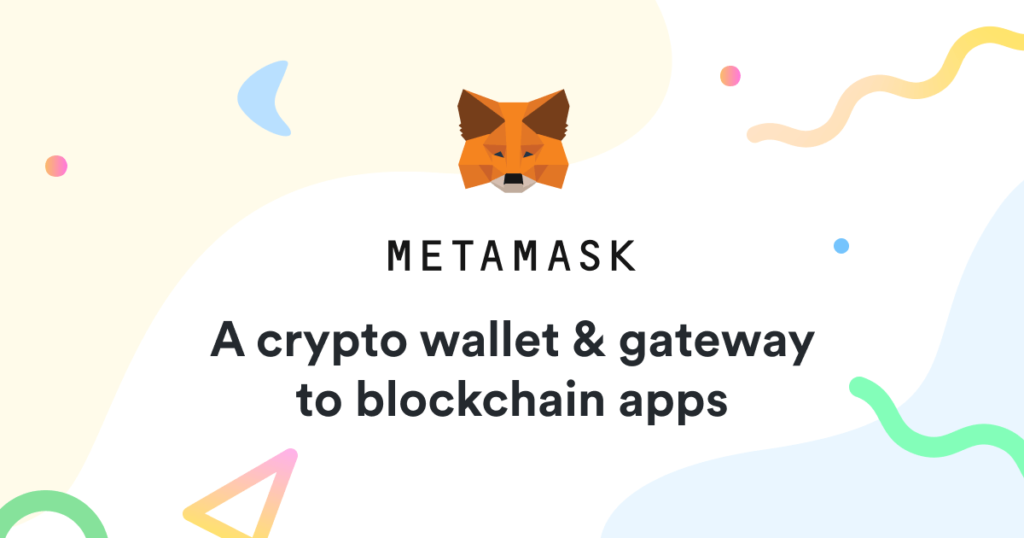
Overview: MetaMask remains one of the most popular and widely used DeFi wallets, offering a seamless bridge between users and the Ethereum blockchain. Initially launched as a browser extension, MetaMask has expanded its services to mobile platforms, providing users with versatile access to a plethora of dApps and DeFi services.
Key Features:
- Multi-Platform Support: Available as a browser extension (Chrome, Firefox, Brave, Edge) and mobile app (iOS, Android).
- Multi-Chain Compatibility: Supports Ethereum and numerous other networks like Binance Smart Chain, Polygon, and Avalanche through custom RPC configurations.
- Enhanced Security: Provides secure key storage, password protection, and optional hardware wallet integration (e.g., Ledger, Trezor).
- Built-in Swap Functionality: Allows users to exchange tokens directly within the wallet through aggregated liquidity sources for optimal rates.
- Customizable Gas Fees: Users can adjust gas fees based on transaction urgency and network conditions.
Pros:
- Widely supported across numerous dApps.
- User-friendly interface suitable for beginners and advanced users.
- Strong community support and regular updates.
Cons:
- Being a hot wallet, it is inherently more susceptible to online threats compared to hardware wallets.
- Users need to be cautious with custom network additions to avoid scams.
Ideal For: Users seeking a versatile and widely accepted wallet for interacting with various DeFi platforms and Ethereum-based applications.
2. Trust Wallet
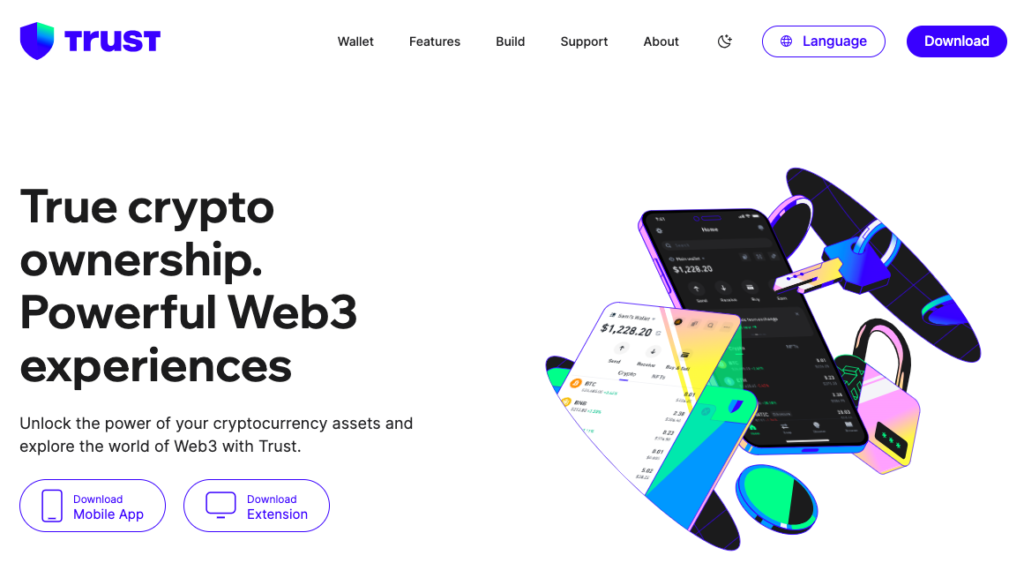
Overview: Acquired by Binance in 2018, Trust Wallet has established itself as a secure and reliable mobile wallet supporting a vast array of cryptocurrencies and tokens. Its open-source nature and decentralized framework make it a favorite among users who prioritize security and privacy.
Key Features:
- Extensive Asset Support: Supports over 1 million assets across various blockchains including Ethereum, Binance Smart Chain, Bitcoin, and more.
- Built-in DApp Browser: Enables seamless access to decentralized applications directly from the wallet interface.
- NFT Support: Allows users to store and manage NFT collections across multiple chains.
- Staking Capabilities: Supports staking for various coins like BNB, TRX, and others, enabling users to earn passive income.
- One-Click Swap: Integrated with services like Binance DEX and 1inch for quick and easy token swaps.
Pros:
- Strong security features including biometric authentication and encrypted private keys.
- User-friendly and intuitive design.
- No personal information required for setup, ensuring user privacy.
Cons:
- Limited to mobile platforms (iOS and Android) with no official desktop version.
- Customer support can be slow due to a large user base.
Ideal For: Mobile users looking for a secure, multi-functional wallet with extensive asset and dApp support.
3. Ledger Nano Series
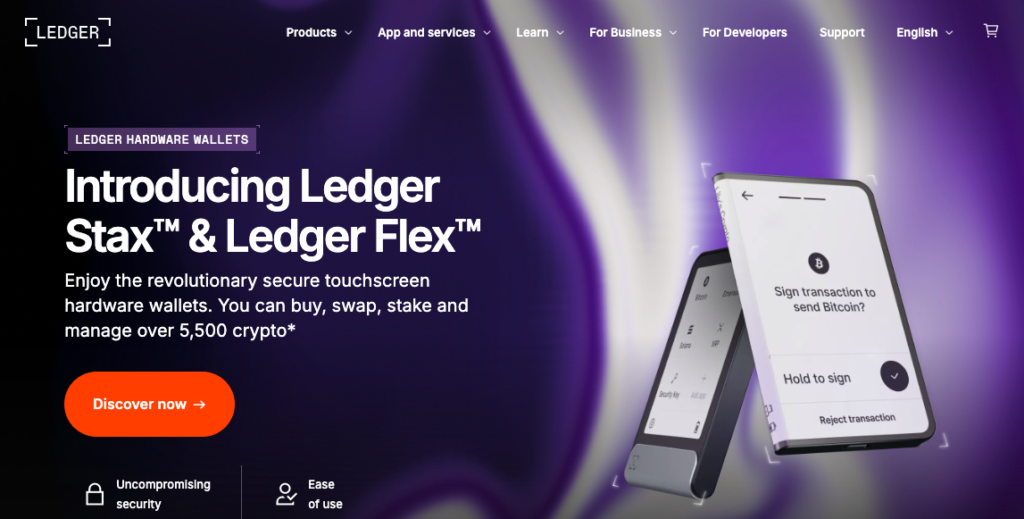
Overview: Ledger is a leading name in hardware wallets, offering top-tier security for cryptocurrency storage. The Ledger Nano S and Nano X models provide offline storage solutions, safeguarding assets from online threats while offering compatibility with various DeFi services through Ledger Live and third-party integrations.
Key Features:
- Unparalleled Security: Utilizes secure element chips (CC EAL5+ certified) to protect private keys from physical and digital attacks.
- Wide Asset Support: Supports over 1800 cryptocurrencies and tokens across multiple blockchains.
- Ledger Live Integration: A comprehensive app for managing assets, staking, and accessing DeFi services directly.
- Bluetooth Connectivity (Nano X): Allows for wireless connection to mobile devices, enhancing portability and convenience.
- Third-Party App Support: Compatible with external wallets and dApps like MetaMask, providing expanded functionality.
Pros:
- Offline storage significantly reduces the risk of hacks.
- Regular firmware updates enhance security and add new features.
- Durable and portable design suitable for everyday use.
Cons:
- Requires physical device for transaction approvals, which may be less convenient for frequent transactions.
- Initial cost is higher compared to software wallets (Nano S Plus: ~$79, Nano X: ~$149).
Ideal For: Users prioritizing maximum security for substantial cryptocurrency holdings and willing to invest in a hardware solution.
4. Coinbase Wallet
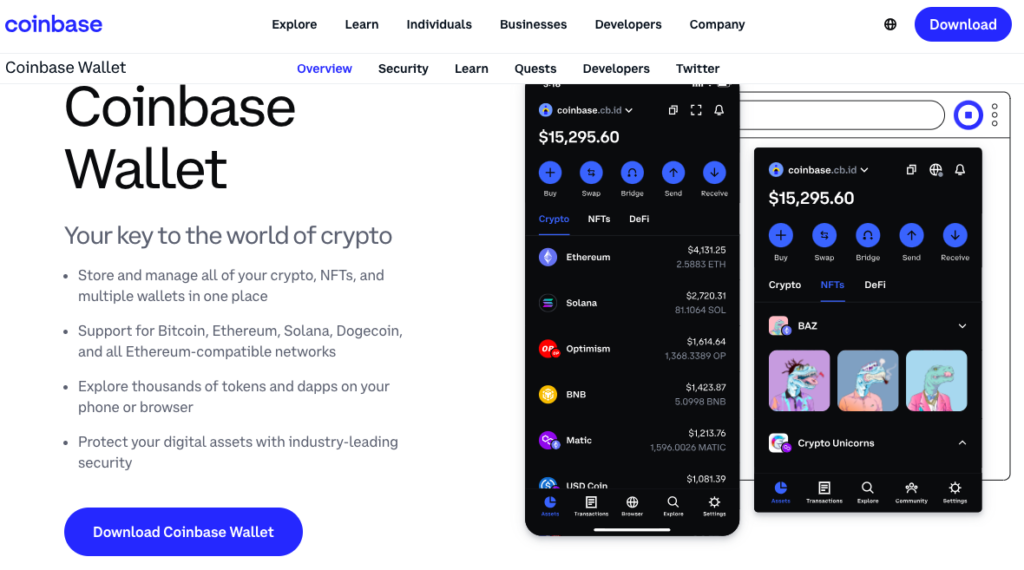
Overview: Coinbase Wallet is a self-custody wallet developed by the renowned Coinbase exchange. It offers a secure and intuitive platform for managing a wide range of cryptocurrencies and accessing DeFi applications, independent of the main Coinbase exchange platform.
Key Features:
- Self-Custody: Users have full control over their private keys and funds.
- Multi-Asset Support: Supports major cryptocurrencies and all ERC-20 tokens, along with NFTs.
- dApp Browser: Integrated browser allows direct interaction with DeFi platforms, decentralized exchanges, and NFT marketplaces.
- Cross-Platform Availability: Available as a mobile app and browser extension for seamless access across devices.
- Easy Fiat On-Ramp: Simplifies the process of purchasing crypto with fiat currencies through integrated services.
Pros:
- Backed by a reputable and regulated company.
- User-friendly interface ideal for newcomers.
- Strong security measures including biometric authentication and secure enclave technology.
Cons:
- Limited support for some less popular blockchain networks.
- Some users may confuse it with the custodial Coinbase exchange wallet.
Ideal For: Users seeking a balance between security, ease of use, and seamless integration with DeFi services, especially those already familiar with Coinbase products.
5. ZenGo
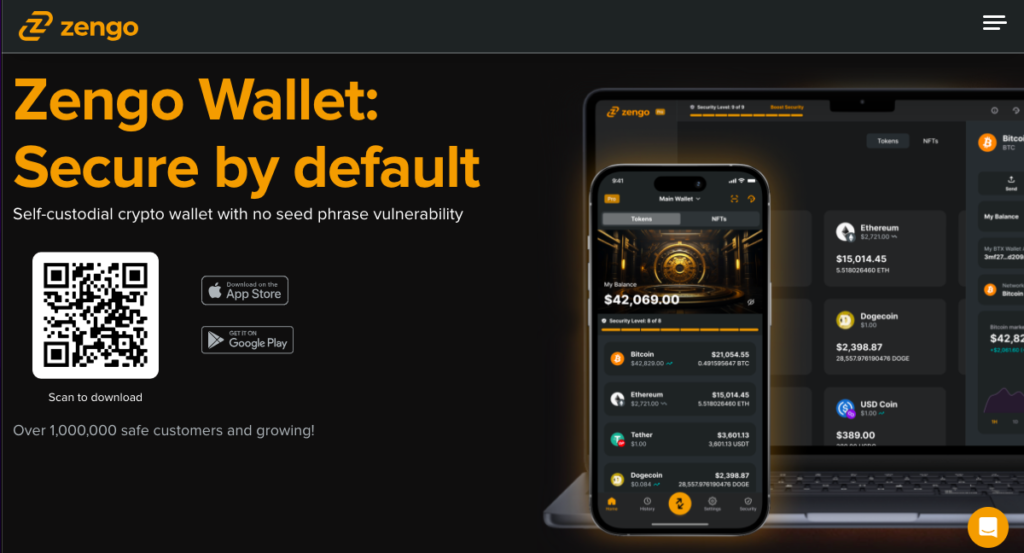
Overview: ZenGo offers a unique approach to wallet security by eliminating private keys and replacing them with advanced cryptography known as threshold signatures. This keyless solution enhances security while simplifying the user experience, making crypto management more accessible to a broader audience.
Key Features:
- Keyless Security: Utilizes threshold signature technology to split the private key between the user’s device and ZenGo servers, reducing single points of failure.
- Biometric Authentication: Secure and convenient access through facial recognition.
- Multi-Currency Support: Supports major cryptocurrencies including Bitcoin, Ethereum, Tezos, and various ERC-20 tokens.
- Built-in Purchase and Swap: Allows users to buy and exchange cryptocurrencies directly within the app.
- 24/7 Customer Support: Provides responsive support through in-app chat for immediate assistance.
Pros:
- Simplified setup and recovery process without the need for seed phrases.
- High-level security measures protect against various attack vectors.
- Clean and intuitive user interface suitable for beginners.
Cons:
- Reliance on ZenGo servers introduces a level of centralization.
- Limited support for some less common tokens and networks.
Ideal For: Users who prioritize security and simplicity, and prefer a hassle-free wallet experience without managing private keys.
6. Exodus
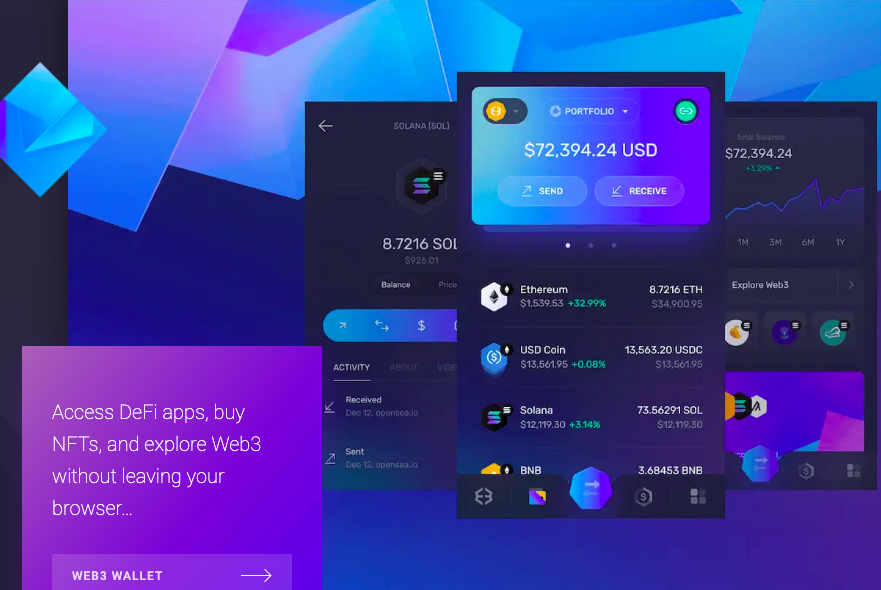
Overview: Exodus is a visually appealing and user-friendly wallet offering support for multiple cryptocurrencies and integration with various DeFi services. Available across desktop and mobile platforms, Exodus provides an all-in-one solution for managing and exchanging digital assets.
Key Features:
- Multi-Platform Availability: Accessible via desktop (Windows, macOS, Linux), mobile (iOS, Android), and browser extensions.
- Extensive Asset Support: Supports over 100 cryptocurrencies including Bitcoin, Ethereum, and numerous altcoins.
- Built-in Exchange: Enables quick and easy asset swaps within the wallet through partnerships with exchange providers.
- Trezor Integration: Allows users to manage Trezor hardware wallet funds through the Exodus interface for enhanced security.
- Portfolio Tracking: Provides detailed portfolio analytics and real-time market data.
Pros:
- Highly intuitive and aesthetically pleasing interface.
- Regular updates introducing new features and asset support.
- Responsive customer support and comprehensive help resources.
Cons:
- Closed-source software may raise transparency concerns for some users.
- Exchange fees can be higher compared to external platforms.
Ideal For: Users seeking a feature-rich and visually engaging wallet experience with convenient asset management and exchange capabilities.
7. Argent
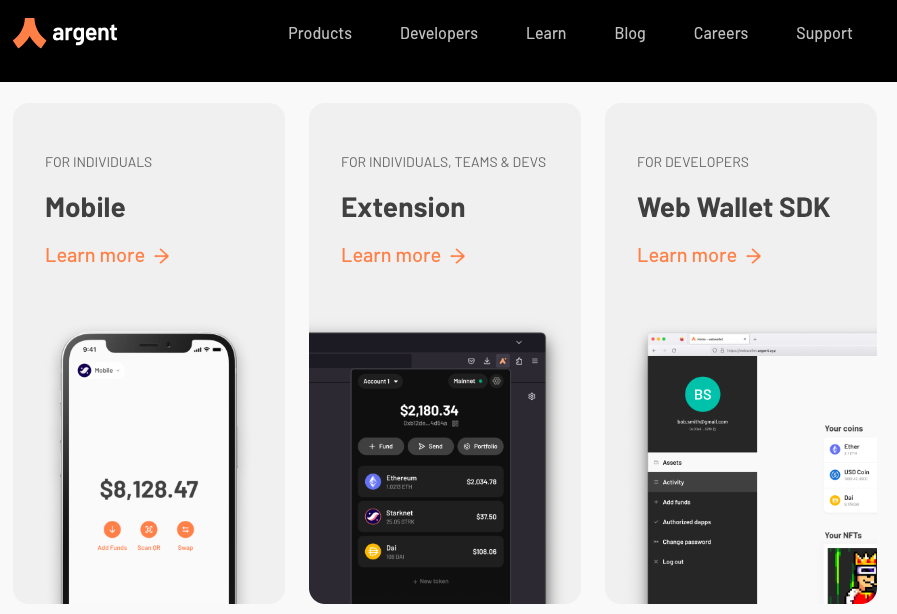
Overview: Argent is an innovative mobile wallet focused on delivering a secure and user-friendly DeFi experience. Leveraging smart contract technology, Argent offers unique features like social recovery and fee-less transactions, setting it apart from traditional wallet solutions.
Key Features:
- Smart Contract Wallet: Utilizes Ethereum smart contracts to enable advanced functionalities like daily transfer limits and whitelisted addresses.
- Social Recovery: Allows users to recover access through trusted contacts, eliminating reliance on seed phrases.
- Fee Subsidization: Covers gas fees for certain transactions, making interactions more cost-effective.
- DeFi Integration: Seamless access to popular DeFi protocols like Aave, Compound, and Uniswap directly within the app.
- Security Measures: Incorporates biometric authentication and optional hardware wallet support for enhanced security.
Pros:
- Simplifies DeFi interactions with a focus on user experience.
- Advanced security features reduce risks associated with lost keys.
- No transaction fees on Layer 2 networks like zkSync.
Cons:
- Currently limited to Ethereum and ERC-20 tokens.
- Mobile-only availability may restrict desktop users.
Ideal For: Users eager to explore DeFi services with a secure, innovative, and easy-to-use mobile wallet solution.
8. Rainbow Wallet
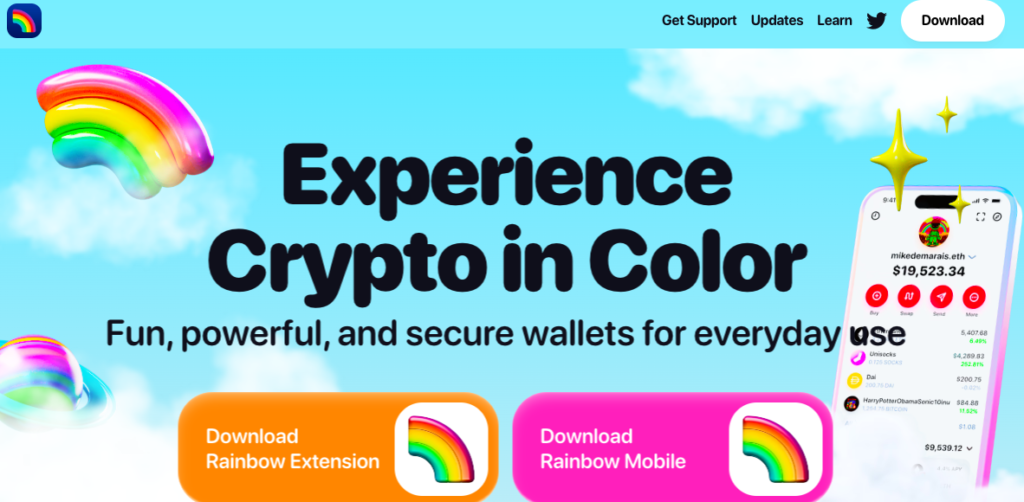
Overview: Rainbow Wallet is a sleek and modern Ethereum wallet designed to provide a seamless and enjoyable user experience. With a strong emphasis on design and usability, Rainbow caters to both newcomers and seasoned crypto enthusiasts looking for an elegant way to manage their Ethereum assets and NFTs.
Key Features:
- Ethereum-Centric: Focused exclusively on Ethereum and ERC-20 tokens, ensuring optimized performance and compatibility.
- NFT Support: Offers a visually appealing interface for managing and showcasing NFT collections.
- Integrated Swap Feature: Allows users to swap tokens directly through decentralized exchanges like Uniswap.
- ENS Integration: Simplifies transactions by supporting Ethereum Name Service (ENS) domains.
- Social Sharing: Enables users to share wallet addresses and NFT collections easily through social platforms.
Pros:
- Exceptional design and user experience.
- Regular updates introducing new features and improvements.
- Open-source code base enhances transparency and community trust.
Cons:
- Limited to Ethereum network; no support for other blockchains.
- Currently available only on iOS and Android platforms.
Ideal For: Ethereum enthusiasts seeking a beautifully designed and user-friendly wallet for managing tokens and NFTs.
9. MathWallet
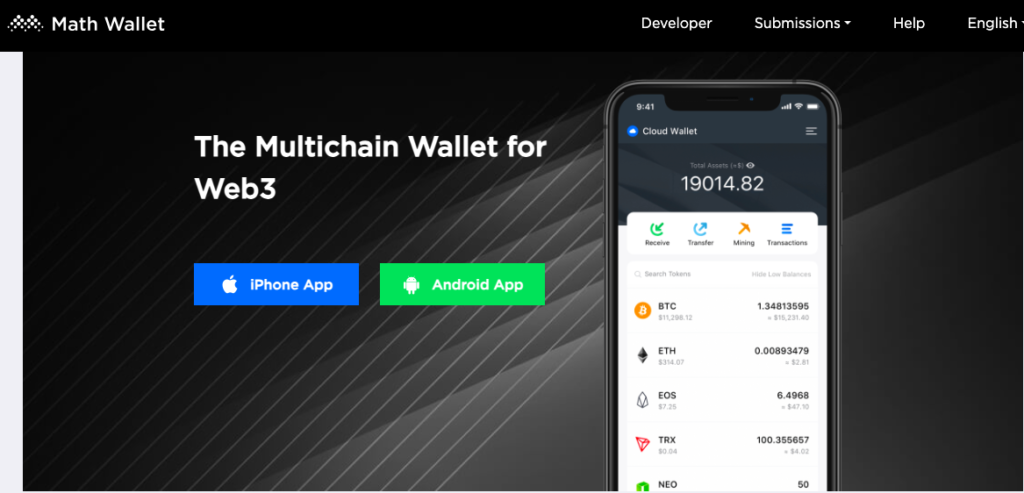
Overview: MathWallet is a comprehensive multi-platform and multi-chain wallet supporting an extensive range of blockchains and dApps. With its robust feature set and flexible accessibility options, MathWallet caters to users looking for a versatile solution for managing diverse crypto assets.
Key Features:
- Multi-Chain Support: Supports over 100 blockchains including Ethereum, Polkadot, Binance Smart Chain, Solana, and more.
- Cross-Platform Availability: Available as mobile apps, browser extensions, and web wallet, ensuring access across various devices.
- dApp Store: Provides a built-in dApp browser with access to numerous decentralized applications across different ecosystems.
- Hardware Wallet Integration: Compatible with popular hardware wallets for enhanced security.
- Developer-Friendly: Offers APIs and SDKs for developers to build and integrate applications seamlessly.
Pros:
- Extensive blockchain and asset support ideal for diversified portfolios.
- Flexible access through multiple platforms and devices.
- Active development and community engagement.
Cons:
- Interface may be complex for beginners due to extensive features.
- Customer support responsiveness varies.
Ideal For: Advanced users and developers seeking a comprehensive and flexible wallet solution supporting a wide array of blockchain networks and services.
10. SafePal

Overview: SafePal offers both hardware and software wallet solutions, providing users with secure and convenient options for managing their crypto assets. Backed by Binance Labs, SafePal combines robust security features with user-friendly design, catering to a broad spectrum of users.
Key Features:
- Hardware Wallet (S1): Affordable and secure device featuring a 100% offline signing mechanism and self-destruct function upon threat detection.
- Software Wallet: Mobile app supporting multiple cryptocurrencies and integrated with various DeFi platforms.
- Integrated DApp Browser: Access to a wide range of decentralized applications across different networks.
- Token Swap and Trading: Supports built-in swaps and direct trading through Binance DEX integration.
- Multi-Layer Security: Combines physical security elements, software encryption, and authentication protocols.
Pros:
- Offers both hardware and software solutions to suit different security preferences.
- Supports a vast number of cryptocurrencies and tokens.
- Competitive pricing for hardware wallet compared to peers.
Cons:
- Hardware wallet lacks Bluetooth or USB connectivity; relies on QR codes, which may be less convenient.
- Software wallet interface can be overwhelming for new users.
Ideal For: Users seeking a balance between security and convenience with options for both hardware and software wallet solutions under one ecosystem.
Conclusion
Selecting the right DeFi wallet is a critical step in ensuring the security and efficiency of your crypto activities. The wallets highlighted in this guide offer a diverse range of features catering to different user needs and preferences. Whether you prioritize security, ease of use, multi-chain support, or advanced DeFi functionalities, there is a suitable option available.
Tips for Choosing the Best DeFi Wallet:
- Assess Your Needs: Determine what features are most important to you based on your crypto activities and experience level.
- Security First: Always prioritize wallets with robust security measures to protect your assets.
- Test User Experience: Try out different wallets to find one that offers a comfortable and intuitive interface.
- Community and Support: Opt for wallets with active development teams and strong community support for continuous improvements and assistance.
- Stay Updated: The DeFi space evolves rapidly; keep an eye on updates and new wallet releases that may better suit your needs.
By carefully considering these factors, you can choose a DeFi wallet that not only safeguards your digital assets but also enhances your overall experience in the decentralized finance ecosystem.
Disclaimer: Always conduct thorough research and consider security best practices when handling cryptocurrencies. This guide is for informational purposes only and should not be considered financial advice.






